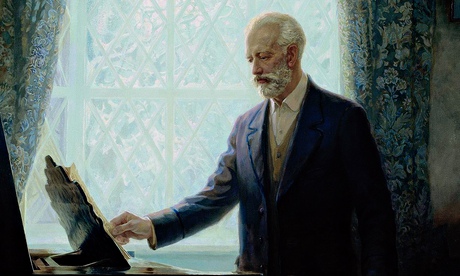
The musicologist David Brown, who has died aged 84 after suffering from Alzheimer's disease, was a leading authority on Russian music whose four-volume study of the composer Pyotr Ilyich Tchaikovsky was acclaimed as the definitive work on the subject.
He also produced other books on Tchaikovsky and on the composers Modest Mussorgsky and Mikhail Glinka, was editor of the New Grove Russian Masters series of composer biographies, and served on the editorial committee of Musica Britannica, the national collection of British music.
Brown had set out on his writing career with a 1969 tome on the Tudor composer Thomas Weelkes, which was followed by a more concise one on his fellow madrigalist John Wilbye (1974). But by the time his second book had appeared he was already well established as an authority on Russian music, and in the same year Mikhail Glinka: a Biographical and Critical Study became the first important study of the composer to appear in English. Then followed his major work, Tchaikovsky: a Biographical and Critical Study, published originally in four volumes (1978–92), but also in a two-volume paperback edition (1992). His masterwork on Tchaikovsky was not only an authoritative biography but a descriptive analysis of his major works, and provided for the Russian composer what Julian Budden had done for Giuseppe Verdi.
The final volume of the study was to prove controversial, as it suggested that Tchaikovsky had taken his own life in 1893, aged 53, after threats were made to expose him as a homosexual. Brown's main source for this theory was a thesis promulgated by the Russian musicologist Alexandra Orlova, who argued that Tchaikovsky had been subjected to a "trial" in a court of honour held by former classmates from the School of Jurisprudence in St Petersburg – following which he chose honourable suicide rather than exposure.
Orlova's ideas were based on hearsay and dubious circumstantial evidence, but were accepted by Brown and a number of other authorities. However, they were strongly contested by others, including the Tchaikovsky scholar Alexander Poznansky, who in a series of publications produced compelling evidence that appeared to demolish the theories of courts of honour and suicide. Nonetheless Brown stuck to his guns, and in a second book in 1993, Tchaikovsky Remembered, he concluded that Tchaikovsky "committed suicide and that the court of honour story should be taken seriously, though [was] certainly not proven".
His new book drew on accounts of Tchaikovsky's contemporaries that had only recently entered mainstream Soviet scholarship, and was a compendium representing more than 80 voices from Russia, western Europe and the US, challenging cliches and received opinions about the composer. Although it did not entirely banish the view of his neurotic moodiness, it did offer evidence of his penchant for practical jokes, a sincere love of children and his willingness to speak without restraint among intimates.
Brown's policy as compiler of the new volume was to refrain from detailed comment, encouraging readers to make up their own minds from the evidence of the documents themselves. His final books were Musorgsky: His Life and Works (2002) and Tchaikovsky: The Man and his Music (2006).
Born in Gravesend, Kent, Brown went to Gravesend grammar school and studied English, Latin and music at Sheffield University, graduating in 1951 and taking his bachelor of music degree in 1952. His knowledge of Russian was acquired during national service (1952–54) at the Joint Services Schools for Linguists at Cambridge University (alongside Alan Bennett and Michael Frayn), and he was commissioned in the Intelligence Corps of the RAF.
After teaching in secondary schools and lecturing as a freelance in adult education, he became music librarian in Senate House at the University of London in 1959, and in 1962 was appointed lecturer at University of Southampton, becoming senior lecturer in 1970, reader in 1975 and professor of musicology in 1983. He retired from Southampton as professor emeritus in 1989.
His wife, Elizabeth, whom he met in Sheffield and married in 1953, was for many years concert manager at the Turner Sims Concert Hall in Southampton and a staff tutor in music in the adult education department of University of Southampton. In 2009 they were jointly awarded the City of Southampton Award in acknowledgement of their services to music in the city.
He is survived by Elizabeth and two daughters, Gabrielle and Hilary.
• David Clifford Brown, musicologist and author, born 8 July 1929; died 20 June 2014

